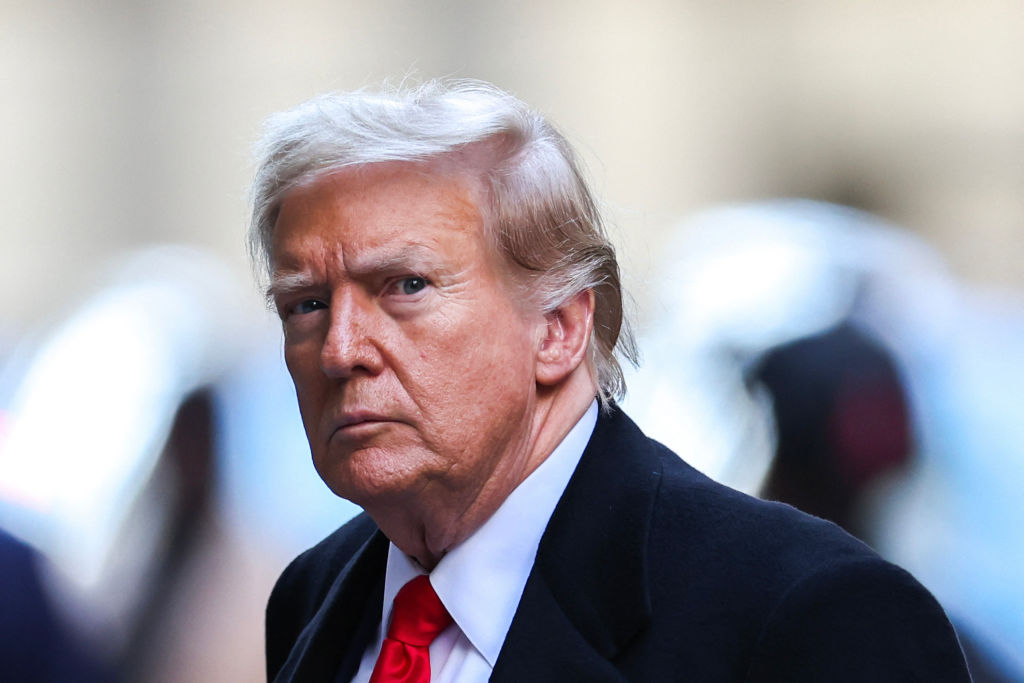
With his first criminal trial set to start next week, Donald Trump on April 5 launched a fresh attack on the judge presiding over the case, one that also tests the boundaries of a gag order issued by the judge against him.
Trump’s presidential campaign publicized a motion filed on April 3 demanding Judge Juan Merchan recuse himself from the New York hush money case "in light of appearances of impropriety" stemming from his daughter’s work with a company that does political marketing for Democratic campaigns.
Trump’s 35-page motion—and its 119 pages of exhibits—comes after Merchan expanded the existing gag order on Trump to include banning him from making public comments about Merchan’s family or that of Manhattan District Attorney Alvin Bragg's, after the former President had repeatedly made comments arguing that the work of Merchan’s daughter meant he couldn’t preside over the jury trial impartially. The order does not prevent Trump from criticizing the judge and the district attorney directly.
Trump seems to be testing a way around the gag order by putting his public criticism of the daughter of the judge into the public court filings themselves, and then promoting the filings.
Read More: A Guide to All of Trump’s Indictments—and Where Each Case Stands
The filing says that Loren Merchan has held leadership positions at a political marketing company called Authentic that was paid to develop ads in 2019 for Kamala Harris’s presidential primary campaign and has since produced ads for the campaigns of Democratic members of congress, including Rep. Adam Schiff and House Minority Leader Hakeem Jeffries.
In demanding that Merchan recuse himself, Trump's legal team argues that the work of Merchan’s daughter for Democratic political campaigns creates “appearances of impropriety" and should be grounds for the judge’s recusal. Trump’s filing also said Merchan's gag order "improperly restricts" Trump's "constitutionally protected campaign speech".
Bragg's office called Trump's claims a "daisy chain of innuendos" that are a "far cry from evidence." Anticipating Trump's motion, prosecutors in the case told Merchan in a letter on April 2 that the court and an advisory committee on judicial ethics have already determined that the political activities of a relative are not a basis to question a judge's impartiality. There is a longstanding practice in American courts that a person’s views are not defined by those of their family members.
Bragg's office went further in a court filing made public on Monday, telling the judge to reject Trump's effort to get him to recuse himself and describing the maneuver as a "last-ditch attempt" to delay the trial set to start in one week. In Monday's filing, Bragg said Judge Merchan should not recuse himself, saying Merchan already denied Trump's request for his recusal last year, and Trump hasn't met the standards for that to be reconsidered.
Bragg described Trump’s motion as "an effort to end-run the order restricting extrajudicial speech" and "pollute the court file with ad hominem" attacks against the judge and his daughter.
Bragg is bringing Trump to trial to face charges he faked business records to cover up a sex scandal involving adult film actress Stormy Daniels weeks before the 2016 election. The trial is set to start on April 15, but would be delayed if Mercan were to agree to Trump's request to recuse himself.
Trump is facing charges in three other criminal cases, including felony charges for trying to reverse his 2020 election loss in Georgia, engineering a violent effort to overturn the election results on Jan. 6, 2021, and refusing to return classified documents after leaving office.
More Must-Reads from TIME
- Cybersecurity Experts Are Sounding the Alarm on DOGE
- Meet the 2025 Women of the Year
- The Harsh Truth About Disability Inclusion
- Why Do More Young Adults Have Cancer?
- Colman Domingo Leads With Radical Love
- How to Get Better at Doing Things Alone
- Michelle Zauner Stares Down the Darkness
Contact us at letters@time.com